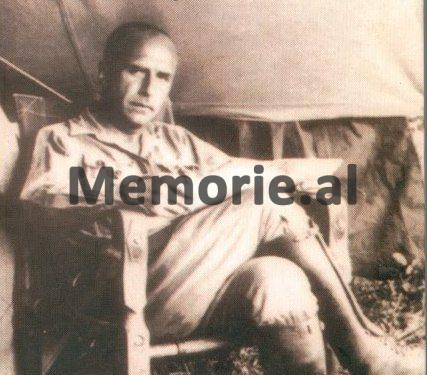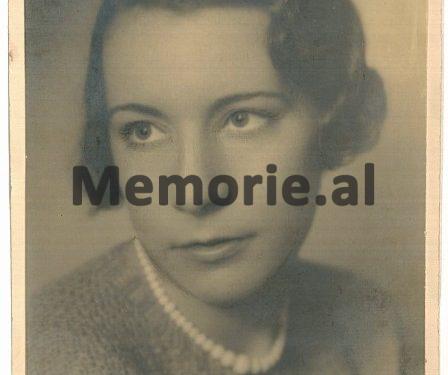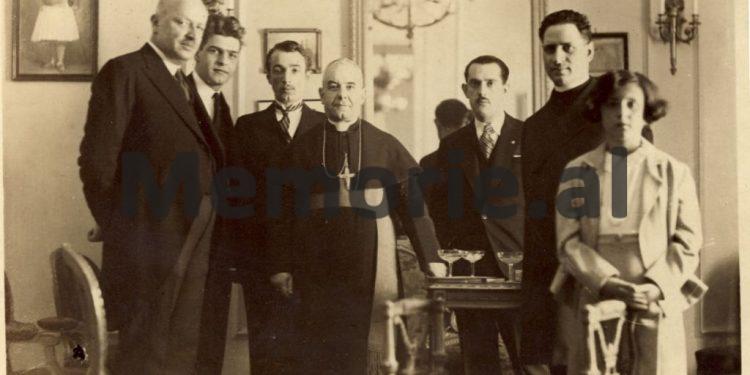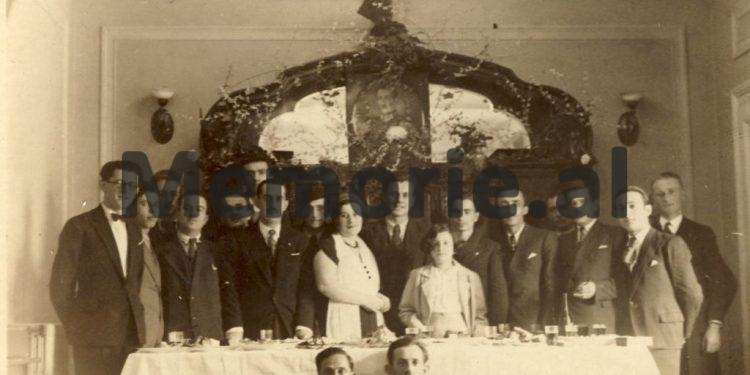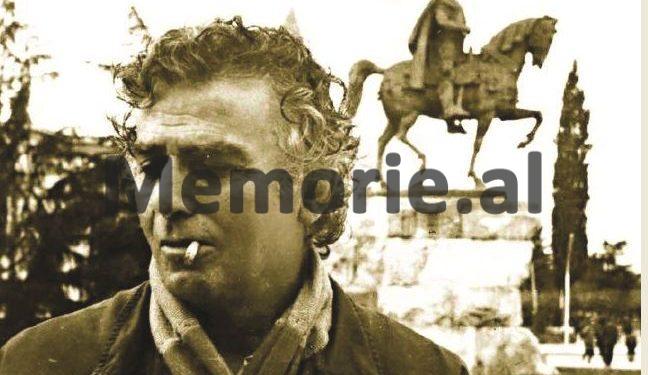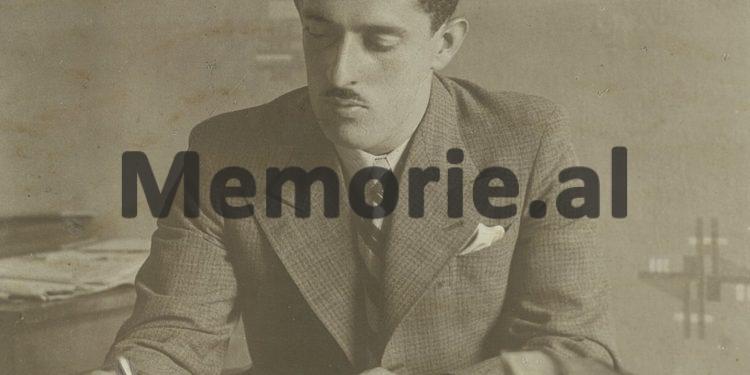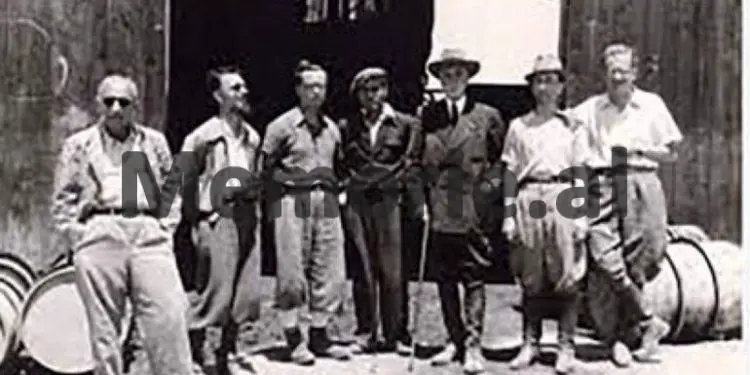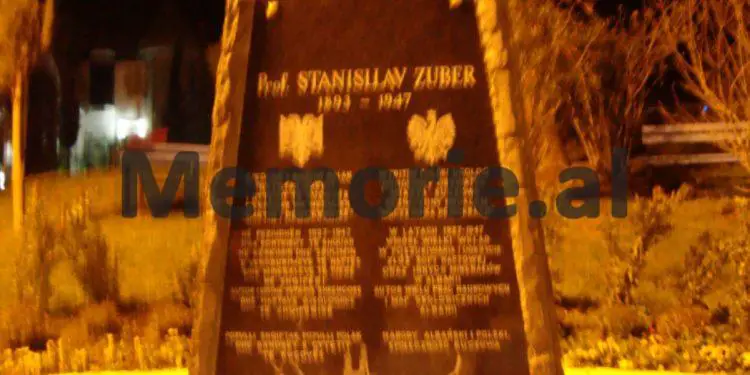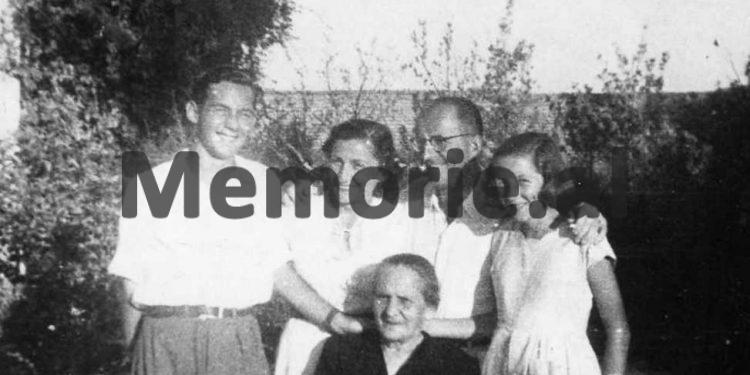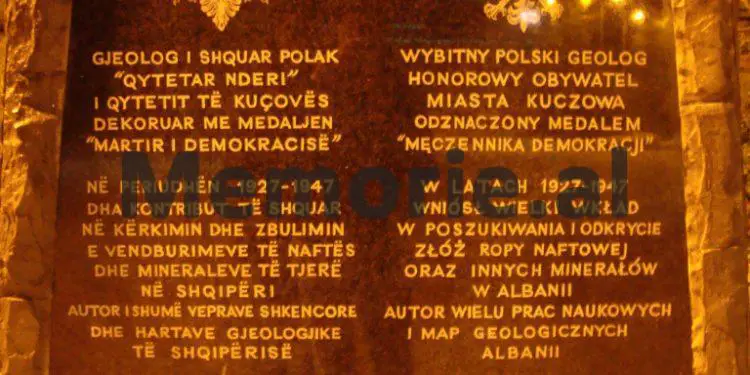Dashnor Kaloçi
Memorie.al publishes some rare memories of the Albanian citizen of Polish origin, Janina Kaczkowska Luarasi, the wife of the former Albanian diplomat of the Zog Monarchy period, Thoma Luarasi, (who lived until 1997 in her house somewhere nearby Orthodox Church on Kavaja Street), regarding her acquaintance in Tirana with the well-known Polish scientist of European proportions, Prof. Dr. Stanislav Zuber, who died in State Security cells on October 18, 1947, after being arrested and charged with being an “Italian agent.” The great contribution of prof. famous Polish who served for 20 years in Albania in the study and research of oil fields, in the papers referred to in 1992, in scientific commemorative activity in his honor, by prof. Luan Peza and Leonard Zisi, president of the Friendship Association, Albania-Poland, as well as the article in the Polish newspaper in 1993, by journalist Stanislav Shçarmiecki.
On October 18, 1947, in one of the cold cells of the “Old Prison” in Tirana, where he had been held for months under torture, accused of being an “Italian agent”, one of the most famous scientists of the European rank in the oil industry, Prof. Dr. Stanislaf Zuber, who after graduating from the Academy of Geology and Mining in Krakow, Poland, and Shella, Russia, in 1927, was called by an Italian company and worked for 20 years in Albania, exploring and discovering oil fields. In our country. The cruel and tragic death of the famous Polish professor who at that time was kept secret by the communist regime would never have been learned if it had not been made public by the great Albanian writer, Petro Marko, who in the days of before allowing the pluralist press, in April 1991, publicly denounced that ugly crime of the communist dictatorship, describing in detail the last moments of life and the death of the famous Polish scientist of European proportions, who gave his life in his hands. , as well as the great author of “Hasta la vista”, at that time was arrested in the Old Prison of Tirana, accused of being a “UNRRA agent”. What was the past of prof. Stanislav Zuberi, where he had studied and graduated, how did he come to Albania, what was his study and scientific work during the period of the Zog Monarchy, how was he initially treated by the communist regime and why was he later arrested by them? For all these and other facts and events from his life, we are reminded of the memories of the lady, Janina Kaczkowska Luarasi, (with Albanian citizenship and Polish origin), who lived until 1997 in her house on Kavaja Street. , as well as the testimonies of prof. Luan Peza and Leonard Zisi, two well-known intellectuals with spiritual ties to Poland, Zuber’s homeland, where they completed their university studies in the late 1950s, who in 1992 organized the first scientific session. commemorative in his honor.
Memories of Albanian citizen of Polish origin, Janina Kaczkowska
One of the people who knew him intimately and had a close friendship with the famous Polish scientist, prof. Stanislav Zuber, who lost his life in torture in one of the cells of the State Security in Tirana in 1947, was also an Albanian citizen of Polish origin, Janina Luarasi Kaczkowska, who has lived in Albania since 1936 (in that year she came to Tirana after marrying Thoma Luarasi, one of the Albanian diplomats of the Zog Monarchy period), and until 1997, when she passed away at her home, somewhere near the Orthodox church on Kavaja Street. In the few memories she has left written about her life, mainly for the long period of 60 years that she lived in Albania, there are also some yellowed sheets, where she described her acquaintance with her compatriot, professor e. famous Polish, Stanislav Zuber. Among other things, in those memories which were fanatically preserved by her son, the chemical engineer, Genc Luarasi, she wrote: “I met Professor Zuber in one of the weekly meetings, a visit to our acquaintances, as soon as I returned from Poland in 1941. He was a gentleman already in old age, with a medium body with a simple appearance, though he was alive, which seemed contradictory to his already gray hair; always surrounded by attentive listeners, whom he attracted with his way of speaking, was this well-known oil expert Stanislav Zuber, a researcher, and discoverer of oil resources in Albania. Over the course of 20 years, he traversed almost all of Albania on foot, wide and long, marking and defining its oil resources. The professor was Polish; in his youth, he studied at the Academy of Geology in Krakow, then specialized in Russia, in Baku, where he also established numerous connections of his profession. In the years that followed, I met the professor beyond our friends, where he came as a friend whenever the work brought him from Kuçova, the largest Albanian oil field, where he lived with his family. I knew him now closely and better by appreciating his character, relentless and fair. After 1944, we met again. Our acquaintances had left Albania, while the professor did not leave Kuçova. Only in the spring of 1946 did we meet by chance on the street for our shared joy. Sadly the news was not good. His wife was also killed during the Kuçova bombing. He himself now lived in Tirana, in a hotel, internet, as long as his works, letters, and maps were subject to control. He was banned from returning to Kucova. In Tirana, he studied ichthyology with the secretary assigned to him. But no particular interest aroused this activity. To my invitation to visit, the professor gladly accepted. Meanwhile, my mother came from Poland after the end of the war, staying with us forever. She told him about her past during the Warsaw bombings, her secret food-free stay for almost six weeks. He listened to everything attentively, he cared about everything. In conversations he was simple and was able to discuss many topics, only his specialty and research were outside the scope of discussions, which he did only with his associates. As spring approached, he began to feel under surveillance, and in late May he was arrested on espionage charges and imprisoned. All attempts to contact him, sending items did not yield results. Official relations between the two countries had not yet been established to have a headquarters in Tirana, while Professor Zuberi could not stand the conditions of imprisonment at that advanced age. He died as a result of exhaustion in the spring of 1947.
Dr. Luan Peza: How the Soviets stole Zuber’s archive from us
One of the few scholars who has dealt much with the figure, life, and work of the famous Polish professor, Stanislav Zuber, is prof. Luan Peza, who graduated from the Mining and Geology Academy in Krakow, Poland in the late 1950s. In an article about prof. Zuberi published in the daily press in the early ’90s, among others prof. Luan Peza wrote: “The figure and work of Stanislav Zuber are wide and polyhedral. Geographical works of the AIPA Society were directed by him. He was the one who discovered the oil fields in Kuçova. Among other things, the museum, archive, and library have been so beautiful, systematic, and rich, valuable treasures of the Albanian land and nation as well as the Polish one. The honorary professor had been arrested by the Communists and he had died in a prison there in October 1947. It had been years since I had been a student at the Academy of Mining and Metallurgy in Poland. A professor asked me, “Sir, what nationality are you?” I stood up and respectfully replied: “I am Albanian.” Surprisingly, that professor, so wise and noble, rose to his feet in exaggeration and said to me: You Albanians are bloodthirsty, so much so that you even kill scientists! Of course, the Albanians were not bloodthirsty, but Enver Hoxha and his associates. In 1992, during the month and a half I worked at the Ministry of Mines, I was only able to browse the archives. The main materials of this archive were by Stanislav Zuber. They were written mainly in Italian, less Albanian, and in any other language. Of course, not only in the so-called ‘Geological Archive’ of the ministry, but also in the then archive of the General Directorate of Petroleum and elsewhere, I learned that the materials and works of Stanislav Zuber were severely damaged, so in 1948, Staniklijev, the first Soviet geologist to come to Albania, pick him up by truck and take him to the Soviet Union, most of Stanislav Zuber’s archive, with the authorization of a deputy minister. Sometime later, large sums of money were spent on the Russian translation of all the works of reports, reports, etc., of foreign geologists. Works by Stanislav Zuberi, such as “Notes on the Tectonics and Evolution of Albania’s Metal Mineral Resources” and “Notes on the Geology and Petroleum Maintenance of Greece”, have been translated and dispensed with for university students. To illustrate the subject, “Geology of Albania”, in addition to maps of other authors, with my own hand I restored, colored, and equipped with conventional signs Geological Map of the scale 1: 2000.000 of Stanislav Zuber. In the cabinet of the Geology of Albania, we did not miss the Tectonic Map of 1: 4000,000 scale. But alas, especially in the early ’70s, the ferocity of the Enverian inquisition crossed every boundary. All works and maps of foreign authors had to be removed from circulation and burned at the cardboard factory. This fate befell even all the texts written by me myself (or in collaboration) on the Geology of Albania, because “they were not permeated by the ideological axis of the Party and did not rely enough on the life-giving lessons of Comrade Enver, and because they made mistakes. ideological “. But why was Stanislav Zuberi martyred in Albania? To answer this question as clearly as possible, in my opinion, it would be wise to recall and paraphrase the last words of Giordano Bruno, when the medieval Inquisition sentenced him to death (With fire in the pile of wood): “I am she dies at a time when she has lost her reason, while the inquisition will be buried the day she is found. ” The Polish scientist, who did so much for the Geology of Albania, Prof. Dr. Stanislav Zuber, was martyred, his figure and work were denigrated, because at the time of the Enverian inquisition: the reason was lost. Thanks to the victory of democracy in Albania, the paths to finding reason are already open. Now also the late Prof. Stanislav Zuber will be restored as he deserves, side by side with other scientists who gave so much to Albania “.
The first commemorative conference for Zuber in 1992
The figure, life, and work of the famous Polish scientist, prof. Stanislav Zuber, who after working with devotion and rare dedication for 20 years in search of oil fields in Albania, lost his life due to torture in the cells of the State Security in Tirana in 1947, was able to officially commemorate it. only in 1992, on the occasion of the 45th anniversary of his death. At that time, a group of Albanian intellectuals grouped in the Albania-Poland Friendship Association, such as Leonard Zisi, Luan Peza, Genc Luarasi, Petraq Xhaçka, etc., who had studied or served as diplomats in Poland, in cooperation with the Faculty of the Mining Geology of the Polytechnic University of Tirana, organized a scientific commemorative conference, in honor of the figure, life and work of the Polish professor, Stanislav Zuber. The announcement given by the Albanian Telegraphic Agency for that memorial meeting, among other things, said: “Professor Dr. Stanislav Zuber, was a world-renowned figure who gave so much for the development of geology in Albania, but that was severely punished by the communist dictatorship. He was a Polish citizen, but since 1926, for 20 years, he has been inextricably linked with Albania, making a special contribution to the development of geology, mainly oil. He is the author of more than 430 scientific papers on Albanian geology. Among other things, Professor Zuberi has worked on the Tectonic Map and the Geological Map of Albania, respectively on the scales 1: 4000.000 and 1: 200.000. During his stay in Albania, he engaged and worked for the needs of the Albanian oil industry. In 1947, he was arrested by the communist regime and tortured to death in Tirana prison on October 18, 1947. To commemorate the brilliant work of this prominent Polish scientist, the conference was attended by the chairman of the Science Committee and Technician, Mr. Maks Konomi, MPs Abdi Baleta and Kurt Xhepa, Rector of the Polytechnic University of Tirana, prof. Gëzim Karapici, Deputy Minister of Industry and Mineral Resources Bujar Nepravishta, as well as employees of scientific institutions and members of the Albania-Poland Friendship Association, etc. The conference was opened by the President of the Albania-Poland Friendship Association, who informed the participants about the decoration that President Sali Berisha had made to Professor-Doctor Stanislav Zuber, awarding him the medal “Martyr of Democracy”, with the following motivation: “His studies and orientations in the service of Albanian geology, which time proved to be accurate, also appreciated by world geological institutions, are based on his figure of a true democrat, who did not bow to the dictatorship, as a scientist. who was massacred and disappeared? ”
That high decoration was handed over to the charge d’affaires a.i. of the Republic of Poland in Albania, Mr. Jezhi Zavalonka from the Chairman of the Committee on Science and Technology, Mr. Max Konomi. Afterward, the occasional speech was given by the Dean of the Faculty of Geology and Mining, Muhamet Doracaj. Afterward, Dr. Petraq Xhaçka and Dr. Stanislav Carencki, a researcher at the Polish Academy of Sciences, gave keynote speeches on Stanislav Zuber’s life and scientific work. Announcements were also made by the scientific staff: Luan Peza, Fotaq Diamanti, Skënder Osmani, Haki Dakoli, and Stavri Curri, and then discussions were held by those who had known Professor Zuberi closely. On this occasion, an exhibition on the life and work of prof. Stanislav Zuberi. It was proposed by the conference that the year 1993, which coincides with the 100th anniversary of the birth of Professor Stanislav Zuber, be commemorated with honor for this outstanding scientist, demanding that international institutions and organizations in the field of science and geology be engaged in these activities.
Leonard Zisi: Albania was not killed by Zuber, but by a dictatorship
In the scientific conference held in 1992 on the occasion of the 45th anniversary of the death of the famous Polish scientist, Professor Stanislav Zuber, the President of the Albania-Poland Friendship Association, Leonard Zisi, took the floor and said: Two days ago, on October 18 this year, it was 45 years since the inhuman torture of the internationally renowned Polish geologist, Professor Stanislav Zuber, died as a result of the inhuman torture inflicted on him in Tirana prison. In this way, the communist dictatorship “rewarded” this famous geologist his contribution of more than 20 years for the good of Albania, in the field of geology. This was a serious crime that every Albanian feels a moral responsibility for this Polish citizen with universal cultural values who were treated barbarically. But Professor Zuberi was not killed by Albania, nor by the Albanian people, for whom he worked passionately for their good for 20 years, but communist dictatorships, that dictatorship that the Polish people, from other countries, had caused before other much greater pains, such as the killing of 14,000 Polish officers in the Katnica forests of Ukraine. On the contrary, Albania and the Albanian people have preserved the memory of the brilliant work of Professor Zuber and after 47 years of the rule of the communist dictatorship, it is removing this stain and giving the deserved place to this prominent figure. The first step in this direction was taken by the well-known writer Petro Marko, who in the first days when the breeze of democracy in Albania began to blow, on April 14, 1991, in the pages of the newspaper “Republika”, denounced the ugly crime of the barbaric murder of Professor Zuber, being a direct witness to the moments of his death. While today another important step is being taken, that of placing in place of his work for the good of Albania “.
Written by Polish journalist Stanislav Shcharmiecki, published in Warsaw in 1993
“Crime against world culture” is the title of Albanian writer Petro Marko, convicted of the communist regime of Enver Hoxha, who describes the last moments of the death of Polish geologist Stanislav Zuber, a genius oil geologist who in 1947 was arrested and died in prison without going to trial. Stanislav Zuber was born on 14.X.1893 in Luov to the family of the eminent geologist, professor at the University of Luov, Rudolf Zuber, who was the eldest son of the Zuber family. Both Stanislav and his younger brother, Kazimireshem, grew up benevolent to the science of geology, and in particular to that of oil, the main direction of their father. After graduating from high school, Stanislav Zuber continued his studies at the University of Laov and later moved to Krakow. His professors, in addition to his father, were Lemiradshi Raciborzhi, Morozhovica. Luov’s war and occupation by the Russian army in 1915 interrupted his studies, and he was transferred to Shella, Russia. With the help of his father’s friends, he found work at an oil exploration firm in Baku. In addition to his work, he studied the geological structures of oil sources of volcanic origin. He published a number of scientific papers. He then returned to Poland in 1924, where he earned a doctorate from the University of Luov. He then continued his studies in the Carpathian region, and in 1927, received his degree from the University of Lagelon in Krakow. His work was highly praised by review professors Shajnoh and Momau. Invited by an Italian company, he left the same year at the University of Lagelon and for 20 years worked in Albania, in the Kuçova area, until his assassination in Tirana prison in 1947. In addition to his studies, research, and discoveries. oil refineries in Albania, he also operated in Montenegro and Italy. In Albania, it was located in Kuçova, which developed as a rich oil field. His research was fruitful: in his direction oil production developed in that period. In addition, he conducted stratigraphic studies summarizing the design of the Tectonic Map in 1942. He also mapped out some regional geological maps. He is the author of over 200 expertise, expressed by Albanian scientists in that session. A small part of them was documented, first by the initial instruction of the Italian leaders of the institution, and then, after the liberation, these documents were not published under the logo of the “State Secretary”, the psychosis of the Hoxha government. After his release, he was first treated as a famous scientist, then persecuted and accused of espionage for having links with his associates in Baku. In the fall of 1947, he was arrested and tortured to death in a prison cell. During his work in Albania, Professor Zuber, participated vividly in scientific life in many international congresses, with the presentation, especially in France, of papers and papers in the field of geology. In Kuçova he set up a geological museum, trained young geologists, and established connections with Albanian scientists. In addition to his homeland, he always valued Albania as equally close to the fruitfulness of his work. In 1942, he started his family by marrying Matjuia Gjianpretro from an Italian aristocratic family, which was killed two years later during the Allied bombing of Kuçova. Stanislav Zuber’s tragic fate is decided by the composition of famous Polish geologists, who are paraphrased in the title of “roofless people”, according to Zhvernovsky, as well as Ludvig Zaincev, Stanislav Zharecmi, Viktor Kuzhmiar, who sacrificed themselves in the service. Their work served as a cornerstone in the construction of Polish geology. Stanislav Shçarmiecki.
Janina Kaczkowska gave evidence of Zuber to the Polish journalist
Part of the evidence and data on the life and work of the famous scientist, Stanislav Zuber, mainly that of his 20-year stay in Albania, the Polish journalist, Stanislav Shçarmiecki, managed to gather from the conversation he had with the Albanian citizen of Polish origin, Janina Kacazkovska, during his visit to Albania in 1992. This is evidenced, among other things, by a letter of thanks that he sends to her a year later, where, among other things, he writes: “Dear Mrs. Once again, thank you very much for the interesting and valuable conversation about Stanislav Zuber. Along with the photocopy of my article, which was published in one of the geological journals. Next year I will talk about Zuber’s life and work with the Polish Geologists Association, and I can write something. I send to you and your son, my best wishes on the occasion of the approaching holidays and I remind you. (Stanislav Shçarmiecki)/Memorie.al




